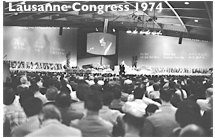
Of gates, spheres and mountains
About forty years ago, the evangelical movement stirred from a century-long hibernation. Authors and speakers like John Stott, Francis Schaeffer, René Padilla and Samuel Escobar awakened awareness that the gospel carried implications beyond evangelism and church planting.
The Lausanne Congress on World Evangelization in 1974 was a watershed event in the modern history of evangelicalism. The famous Lausanne Covenant, of which Stott was chief drafter, created a global consensus to share God’s concern ‘for justice and reconciliation throughout human society and for the liberation of men and women from every kind of oppression.’
While evangelicals in the eighteenth and nineteenth centuries had led social reform on both sides of the Atlantic, a ‘Great Reversal’ had taken place as the twentieth century approached. Those committed to the authority of the Bible became defensive, focusing on preaching the ‘true gospel’ of salvation by faith. Liberals stressed the so-called ‘social gospel‘ and contemporary relevance.
At Lausanne, the Argentinian Padilla and the Peruvian Escobar brought refreshing Latin American insights by stressing themes of justice in the Bible.
Schaeffer, founder of L’Abri and described by TIME magazine as a missionary to Europe’s intellectuals, was by then introducing a generation of educated evangelicals to Calvinistic worldview thinking, engaging with the arts, philosophy and politics. He pleaded passionately at Lausanne for taking this worldview to an unbelieving world.
Classrooms
A year later, in the summer of 1975, the founders of two major mission movements began to speak about a new understanding they felt God had given them, broadening the definition of the Great Commission.
Bill Bright of Campus Crusade, famous for his ‘Four Spiritual Laws’, identified some ten areas of society in which the gospel should bear fruit, and quickly produced a book explaining his insight.
YWAM founder Loren Cunningham was in the Colorado Rockies when he received new understanding about the ‘classrooms’ through which nations are discipled. The first occasion when he shared about this was a European staff conference in Chichester, England, early September 1975.
I was a rather reluctant participant at this event. I had just arrived in Europe to join a ministry called ’Dilaram Houses’ led by Floyd McClung. Dilaram emphasised friendship evangelism among hippies, world travellers and seekers along the drug trail from Amsterdam to Delhi. This holistic emphasis attracted me. For I had been helped by Schaeffer’s books during my student years when I had struggled to relate my faith with my studies. I had also been introduced to the life and work of Abraham Kuyper, the Calvinist journalist-theologian-educationalist-politician who was prime minister of Holland over a century ago.
So when Floyd invited me to come to Holland to edit a magazine published by Dilaram, I accepted, only to discover that Dilaram was now joining YWAM. To be honest, that didn’t excite me. I saw YWAM as a ‘bible-bashing‘ outfit out to save souls. What interested me was a gospel with ‘social, political and economic dimensions’.
Overlapping
But when Loren began to share at that conference in Chichester about the implications of the gospel for such spheres of life as government, the arts and education, as well as the church, I was relieved. Maybe there could be room for me in YWAM after all!
I still have my reporter’s notebook with notes from that presentation. Loren talked about the church, the family, the school, the arts, the government and the media. He mentioned comparing lists with Bill Bright and how much they had overlapped. Later business was added as a seventh influential sphere.
Time has passed and Loren’s list has become widely known as the Seven Spheres. Others have repackaged it as Seven Mountains. Loren acknowledges there are other ways of categorising society, but he believes these are the basic seven.
Calvin and Kuyper however identified other fields and spheres in earlier times, profoundly impacting Geneva and Holland respectively. Landa Cope and Darrow Miller, frequent speakers in YWAM circles, use similar but different lists; Darrow talks of nine ‘gates’ of the city. For over twenty years, we have worked with an even broader list to create networks in Hope for Europe.
Sometimes I squirm a little when I hear the ‘Seven Spheres’ or ‘Seven Mountains’ presented as dogma. We should remember that these are human interpretations, and should not be presented as explicit Biblical teaching. Useful as such lists are to open our eyes and inspire strategy, they should not prevent creative and innovative thinking–and fresh revelations–from younger generations.
Till next week.
Jeff Fountain

This Post Has 0 Comments